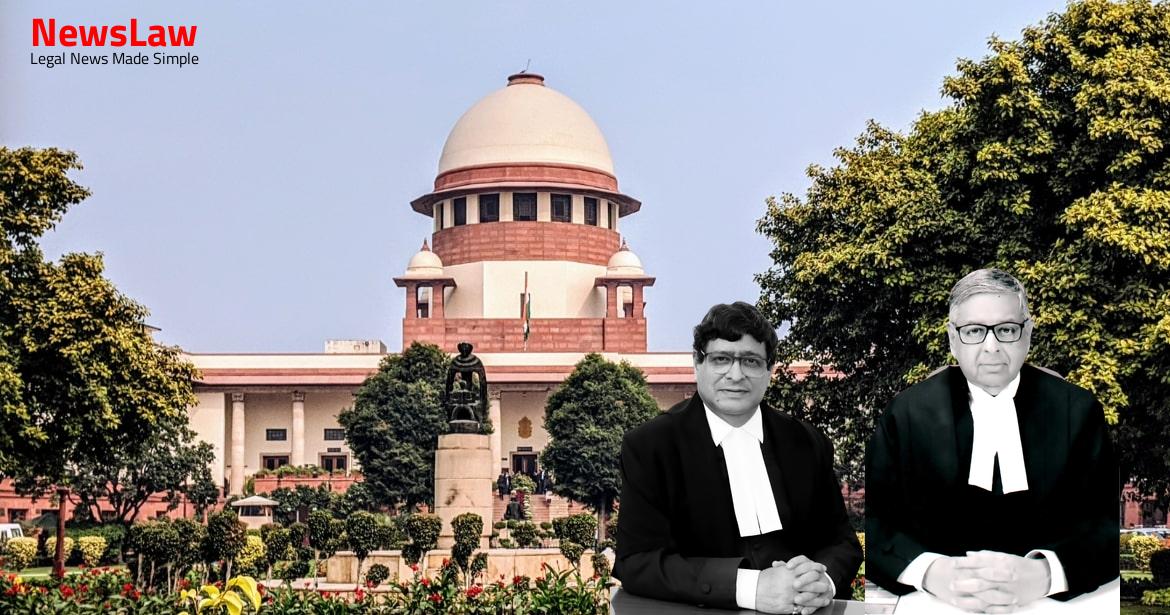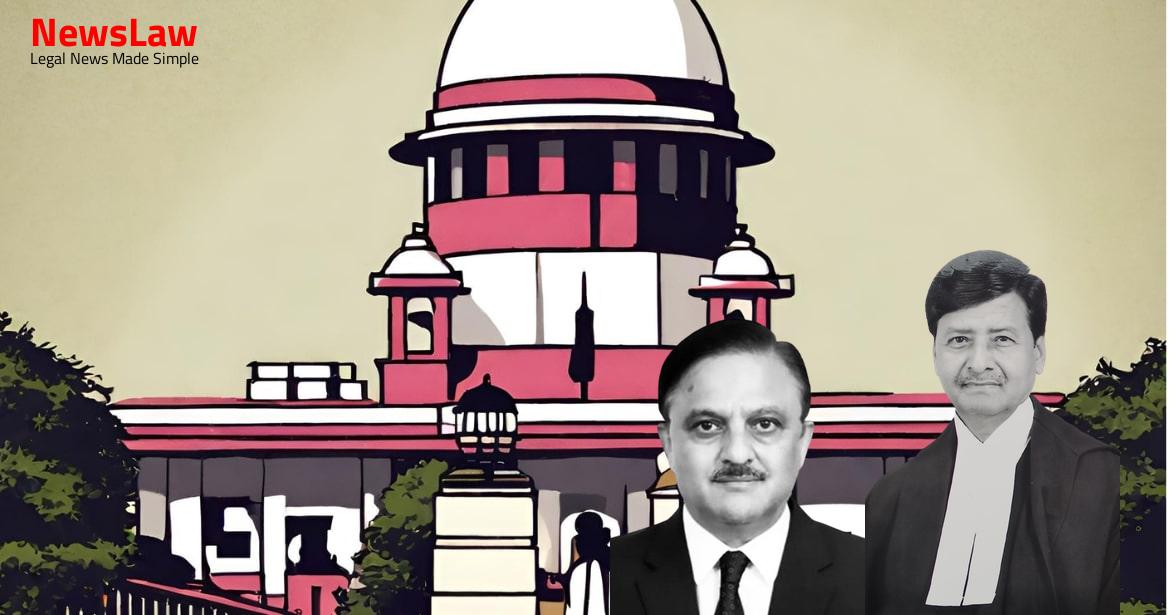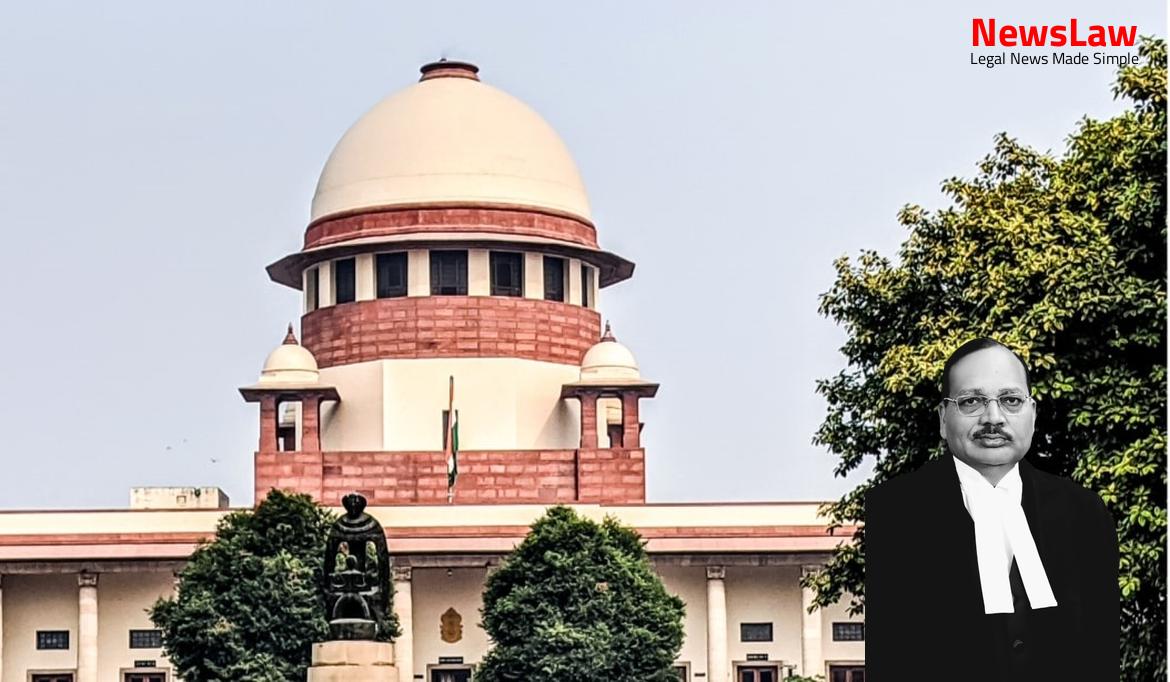Discover the legal intricacies and analytical insights provided by the court in a recent case involving a Cooperative Bank. The court’s thorough examination of the maintainability of writ petitions against Cooperative Societies sheds light on the complex relationship between government control and legal remedies. Learn more about the legal principles elucidated in this case analysis.
Facts
- The appeal challenges the judgment and order dated 03.09.2014 passed by the High Court of Himachal Pradesh at Shimla in LPA No.316 of 2012.
- The Single Judge of the High Court directed that withdrawing the pension scheme approved by the General House, which is the final authority, is contrary to the provisions of the Policy.
- The second respondent acted beyond his delegated powers under the Act according to the judgment.
- Respondent No. 2 is directed to place the Scheme before the General House for reconsideration and a final decision.
- The State’s admission of having over 50% share in the bank’s capital.
- The impugned orders discontinuing the policy are quashed and set aside.
- The Registrar of the Cooperative Societies is a member of Himachal Pradesh Administrative Services.
Also Read: Balancing Power and Transparency: Electoral Bonds Struck Down, Disclosure Mandated
Issue
- The question of whether Kangra Bank is a State within the meaning of Article 12 of the Constitution of India has been previously addressed and is no longer an open issue.
- This issue has been settled and there is existing precedent on the matter.
Also Read: Recall of Resolution Plan Approval: Legal Analysis
Arguments
- Ms. Pragati Neekhra, Advocate for the H.P. State Cooperative Bank Ltd. submitted the additional affidavit.
- Mr. Kavin Gulati, Senior Advocate, Mr. Abhinav Mukerji, Additional Advocate General for the State, and Mr. Ritesh Khatri, Advocate for the Bank were heard in support of the appeal.
- The Full Bench considered the issue of maintainability, with observations summarizing the law on the point.
- The petition was found maintainable based on the facts recorded in the judgment.
- The Single Judge’s decision in allowing the writ petition was upheld, and the Division Bench was noted to be in error in setting it aside and rejecting the review petition.
Analysis
- The issue of maintainability of a writ petition against Kangra Central Co-operative Bank Ltd. came up before the Full bench of the High Court.
- The State Government has deep and pervasive control over the functioning of the Bank.
- The writ petition was held to be maintainable against the respondent bank.
- The Cooperative Societies Act reveals significant control of the State Government over the respondent-Society.
- The decision on whether a writ can lie against a Cooperative Society depends on the facts of each case.
- The Review Petition against the Full Bench decision was rejected, emphasizing State Government control over the Bank.
- The further action on the case files was directed to be returned to the Registrar Cooperative Societies for appropriate action.
- The Division Bench refused to entertain the Special Leave Petition and directed the matter to proceed on merits before the appropriate Bench.
- The Single Judge dealt with the issue of maintainability of the writ petition during his judgment and observed that it was maintainable, considering the State Government’s control over the Bank.
- Four of the six petitioners were granted regularization to the next higher post by the State Government.
- The respondent-bank was considered an instrumentality of the State within the meaning of Article 12 of the Constitution.
- The Division Bench did not give a definite answer on whether a writ would lie against Cooperative Banks, leaving it subject to case-specific determination.
- The High Court, under Article 226 of the Constitution, can issue a writ or order in the nature of writ against any person or Authority based on the facts of the case.
- The Apex Court in S.S. Rana’s case has authoritatively answered the issue.
- The Division Bench of the High Court in Chandra Kumar Malhotra’s case has also provided a response.
- The issue can be resolved based on settled legal principles and considering the guidance from S.S. Rana’s case.
- No conflicting decisions from a co-ordinate Bench or Larger Bench of the High Court have been noted in the case of Jogindra Central Cooperative Bank.
- The Division Bench, based on a previous decision in Sanjeev Kumar & Others v. State of Himachal Pradesh & Others, overturned the Single Judge’s view in the present case.
- The other two petitioners have also been granted a similar benefit.
- The appeal is allowed and the view taken by the Division Bench is set aside.
Decision
- Joint Registrar (Credit) Cooperative Societies, H.P. directed the respondent bank to consider the applicants/petitioners and other similarly situated subordinate category employees for promotion to vacant post of junior clerks/Gr.IV.
- Period of service rendered by the applicants/petitioners as sub-helpers on contract/ad hoc basis to be considered as qualifying service for promotion by the bank.
- Division Bench had not dealt with the matter on merits, and hence the LPA No.316 of 2012 was restored to the file of the Division Bench for disposal within three months.
- Special Leave Petition (Civil) No.4518 of 2016 challenged the judgment and order passed by the High Court of Himachal Pradesh at Shimla in Civil Writ Petition No.6709 of 2013.
Case Title: THE KANGRA CENTRAL COOPERATIVE BANK PENSIONERS WELFARE ASSOCIATION (REGISTERED) Vs. STATE OF HIMACHAL PRADESH (2022 INSC 826)
Case Number: C.A. No.-005251-005251 / 2022



